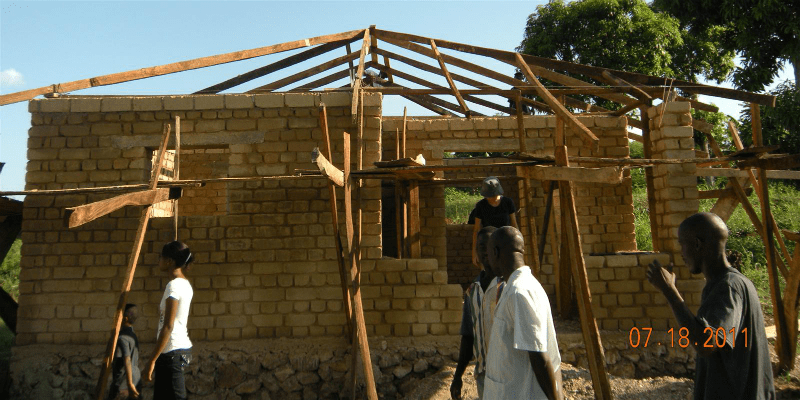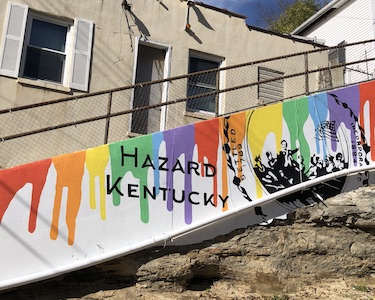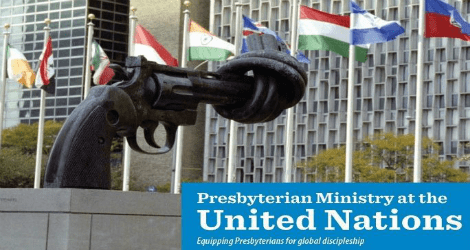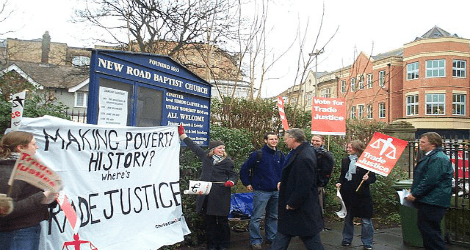Help Build Eco-Villages in Haiti… Not for, but with
By Ruth Farrell, Coordinator, Presbyterian Hunger ProgramThey will build houses and dwell in them;
they will plant vineyards and eat their fruit.
No longer will they build houses and others live in them,
or plant and others eat.
For as the days of a tree, so will be the days of my people;
my chosen ones will long enjoy the work of their hands.
They will not labor in vain,
nor will they bear children doomed to misfortune;
for they will be a people blessed by the LORD,
they and their descendants with them. (Isaiah 65:21-23)
I felt like I was seeing Isaiah’s words happening before my very eyes. Estin Andral is a young man filled with hope for the future. Today, he is living in a tent, but it is only for another month. Every day he works with six other men under the guidance of a structural engineer to build 10 houses. These houses are part of an Eco-Village in Haiti’s Central Plateau. They will have a community center, rain catchment and water system, ecological latrines, and most importantly gardens and fields that will feed their families and provide them with livelihoods. When the houses are built and the crops are ready for harvest, their families, as well as some families headed by widows with children, will leave their tents in Port au Prince to join them. And the houses will be theirs for as long as their family or their descendants work the land and participate in the community.
 We all saw the tent cities in the aftermath of the earthquake that hit Haiti. I have learned volumes about how difficult it is to provide housing for these victims. You would think that it would be simple to go help build houses but quickly there are issues. On whose property do you build houses since most of the victims were renters? Does housing include sewage and water systems? Quantity vs. quality? Cultural values too: can you imagine someone building you a house in the U.S. without windows? That would be the equivalent of building a house in Haiti without an outside cooking area. Using local building materials is important. Are you bringing in nails and pre-fab pieces or are you buying local materials, which strengthen the Haitian economy?
We all saw the tent cities in the aftermath of the earthquake that hit Haiti. I have learned volumes about how difficult it is to provide housing for these victims. You would think that it would be simple to go help build houses but quickly there are issues. On whose property do you build houses since most of the victims were renters? Does housing include sewage and water systems? Quantity vs. quality? Cultural values too: can you imagine someone building you a house in the U.S. without windows? That would be the equivalent of building a house in Haiti without an outside cooking area. Using local building materials is important. Are you bringing in nails and pre-fab pieces or are you buying local materials, which strengthen the Haitian economy?
Foreign non-profit organizations came in and built lots of temporary housing. This housing should last perhaps 5 years. Hopefully, by then, the occupants will have built up enough assets to buy property or build permanent housing. Although very grateful to get out of tents, families find the housing tracts crowded. There is no space for vegetable gardens and they are far from employment opportunities. The Presbyterian Church (U.S.A.) through Presbyterian Disaster Assistance (PDA) will fund some of this housing for approximately 150 families in Leogone, where the earthquake hit families the hardest and where the housing is the best of the temporary housing being built. It includes sewage and water; and is not too far from job opportunities. It will provide shelter as these families get back on their feet.
At the same time, Mouvman Peyizan Papay (MPP), the Presbyterian Hunger Program’s long-time Haitian partner, has requested assistance to help 40 families build four eco-villages in the Central Plateau. This is permanent housing in a grouping of 10 homes complete with ecological latrines, water catchment, space for gardens and animals, a community center, and fields. Families who move here are taking on farming livelihoods with the technical assistance of MPP. They will be able to grow their own food and sell the surplus through cooperatives in which they can get better prices.
And, MPP is inviting you to help. There are some criteria though. You must be willing to work under Haitian supervision alongside Haitians. You must be willing to learn for a couple of hours each day about the challenges for small farmers from the experiences of Haitians. You must be willing to believe in Haitian farmers’ vision for a Haiti in which Haitian farmers are feeding their people instead of producing crops for bio-fuels or export. You must be willing to use hand-made tools and traditional knowledge in the building of homes and farming of fields.
If you are willing to do all that and to live in simple housing and eat Haitian food, then this could be an invitation for you to meet Haitians who will rock your world. PHP is not sponsoring trips but we are connecting Presbyterians and others to MPP and mission co-workers in Haiti who can facilitate this kind of short-term mission experience.
That said, I warn you that Isaiah’s words talk of a world in which there is real justice. Is it pie in the sky or is it possible? If it is possible, God has chosen to work through each of us to bring about this kind of world.
Take Action and Learn More
- Contact Jessica Maudlin (Jessica.Maudlin@pcusa.org; 502-569-5832) to learn more about the Presbyterian Hunger Program and to get involved with the Mouvman Peyizan Papay (MPP).
- Visit Mark Hare’s Haiti Mission Co-Worker webpage and blog.
- Check out this Bible Study and Video, produced by David Barnhart, about the seed project and partnership with MPP (the video is below).
- Learn more about the PC(U.S.A.) and Presbyterian Disaster Assistance’s response to Haiti.
Watch “Impact Through Seeds”
______________________________________________________________________
 Ruth Farrell is the Coordinator for the Presbyterian Hunger Program (PHP). Ruth brings 14 years of overseas experience in Peru and Congo working with networks of churches and non-profit organizations to address causes of poverty in their communities through successful campaigns and sustainable projects. North American work experiences include directing a microenterprise program through the Jewish Family and Vocational Service in Louisville, Kentucky, and working in the public policy arena for Senator Richard G. Lugar (Washington D.C.). She has a MBA in international finance from the George Washington University.
Ruth Farrell is the Coordinator for the Presbyterian Hunger Program (PHP). Ruth brings 14 years of overseas experience in Peru and Congo working with networks of churches and non-profit organizations to address causes of poverty in their communities through successful campaigns and sustainable projects. North American work experiences include directing a microenterprise program through the Jewish Family and Vocational Service in Louisville, Kentucky, and working in the public policy arena for Senator Richard G. Lugar (Washington D.C.). She has a MBA in international finance from the George Washington University.






Unbound Social